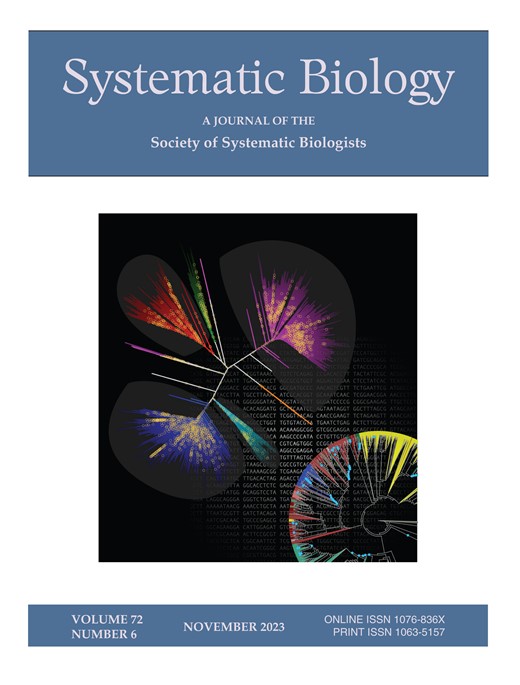Introgressed variants obscure phylogenetic relationships but are not subject to positive selection in Australasian long-tailed parrots.
IF 5.7
1区 生物学
Q1 EVOLUTIONARY BIOLOGY
引用次数: 0
Abstract
Gene flow often obscures phylogenetic relationships but the evolutionary significance of introgressed variants is unclear. Here we examine the Australasian long-tailed parrots (Psittaculinae: Polytelini) in which an unexpected sister relationship between Polytelis alexandrae and the genus Aprosmictus, and not the other Polytelis species, has been observed. We tested whether this relationship was due to ancient introgression in whole genomes. We found that the majority of gene trees had Ap. erythropterus and P. alexandrae as sister taxa, whereas network analysis indicated monophyly of Polytelis, 48% of gene trees being in phylogenetic conflict due to introgression from Ap. erythropterus into P. alexandrae. Further analyses confidently confirmed that 4-8% of the genome of P. alexandrae was introgressed from Ap. erythropterus with signals of gene flow occurring throughout the genome. These findings indicate that topologies with P. alexandrae and the genus Ap. erythropterus as sister taxa were biased by gene flow and affirm that Polytelis is monophyletic. Next, we assessed the evolutionary outcomes for introgressed variants and found that, among introgressed protein-coding genes, only two (0.8%) were under positive selection, in comparison to 99 (1.7%) of non-introgressed genes. Our results indicate that, despite the ubiquity of detectable introgression in phylogenies, many genetic variants flowing between species may play a minor role in molecular adaptations.在澳大利亚长尾鹦鹉中,渐渗变异模糊了系统发育关系,但不受正选择的影响。
基因流动往往模糊了系统发育关系,但渐渗变异的进化意义尚不清楚。在这里,我们研究了澳大利亚长尾鹦鹉(长尾鹦鹉科:长尾鹦鹉),其中发现了一种意想不到的姐妹关系,即Polytelis alexandrae和approsmictus属,而不是其他长尾鹦鹉物种。我们测试了这种关系是否是由于整个基因组的古代基因渗入。结果表明,大部分基因树的姊妹类群为红翼藓和亚历山大山藓,而网络分析结果显示,红翼藓和亚历山大山藓是单系的,48%的基因树由于从红翼藓向亚历山大山藓的渗透而发生系统发育冲突。进一步的分析证实了4-8%的alexandrae基因组是由app . erythropterus渗入的,基因流动的信号发生在整个基因组中。这些研究结果表明,以alexandrae和Ap. erythropterus为姐妹类群的拓扑结构受到基因流的影响,证实了Polytelis是单系的。接下来,我们评估了渐渗变异的进化结果,发现在渐渗的蛋白质编码基因中,只有两个(0.8%)处于正选择状态,而非渐渗的基因有99个(1.7%)处于正选择状态。我们的研究结果表明,尽管在系统发育中普遍存在可检测到的渗入,但物种之间流动的许多遗传变异可能在分子适应中起着次要作用。
本文章由计算机程序翻译,如有差异,请以英文原文为准。
求助全文
约1分钟内获得全文
求助全文
来源期刊

Systematic Biology
生物-进化生物学
CiteScore
13.00
自引率
7.70%
发文量
70
审稿时长
6-12 weeks
期刊介绍:
Systematic Biology is the bimonthly journal of the Society of Systematic Biologists. Papers for the journal are original contributions to the theory, principles, and methods of systematics as well as phylogeny, evolution, morphology, biogeography, paleontology, genetics, and the classification of all living things. A Points of View section offers a forum for discussion, while book reviews and announcements of general interest are also featured.
 求助内容:
求助内容: 应助结果提醒方式:
应助结果提醒方式:


